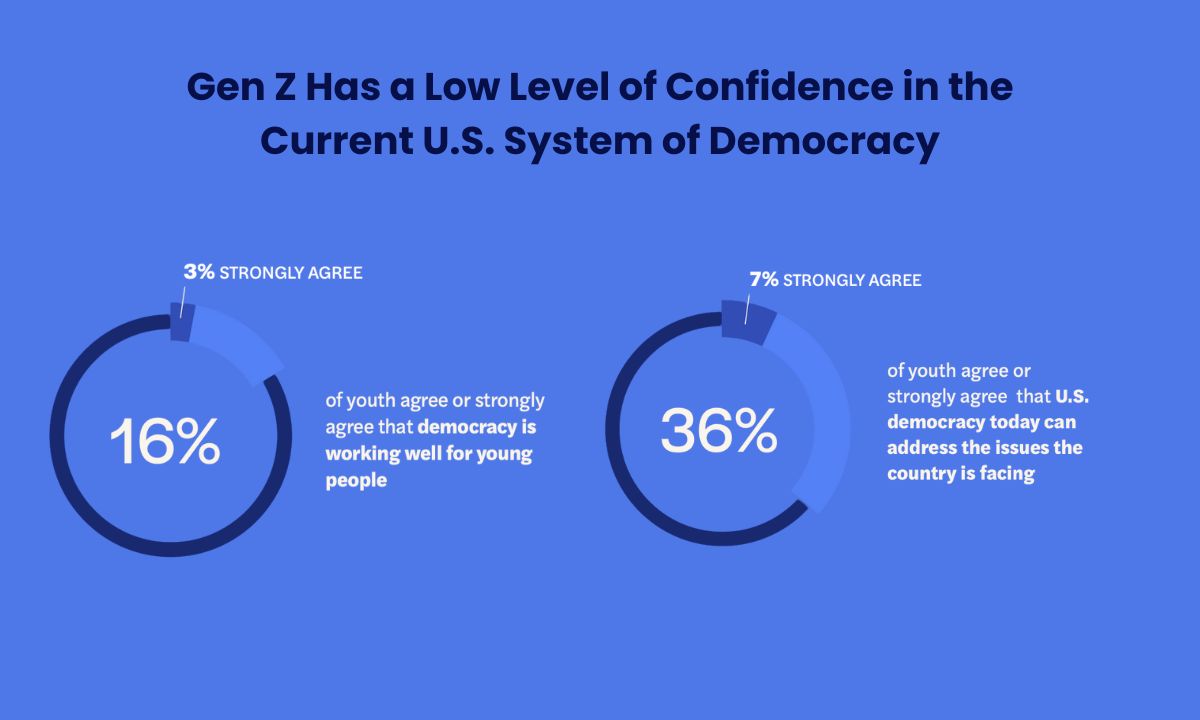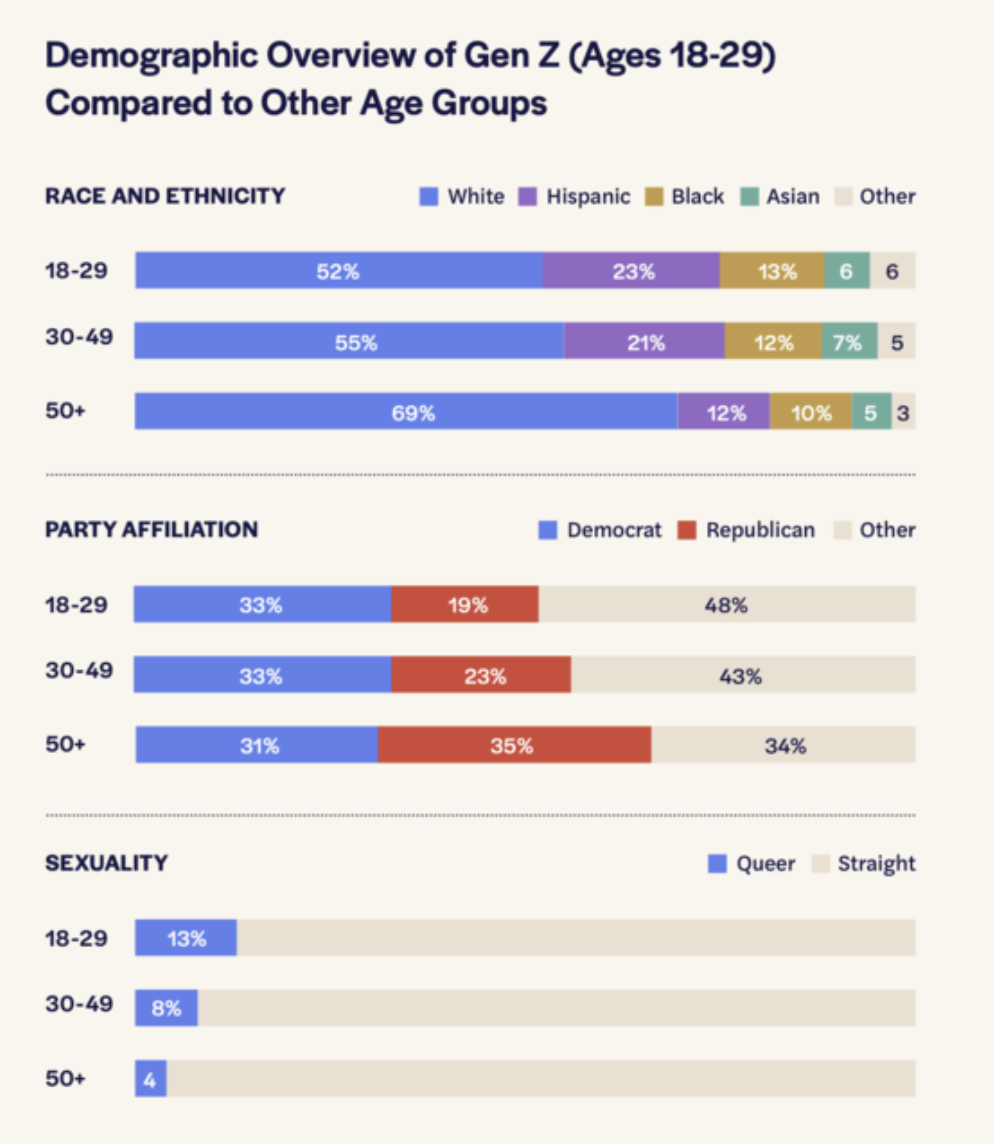Gen Z Has a Complex Relationship with Democracy, Survey Reveals
Their views, the study’s authors note, were not as much divided by race and gender, but by socioeconomics and access to civics education.

Get stories like this delivered straight to your inbox. Sign up for The 74 Newsletter
A nationally representative poll designed to gauge Gen Z’s attitude toward democracy contradicts a popularly held belief that the generation born roughly between 1997 and 2012 doesn’t care about it at all.
While a majority agree on democracy’s importance, many feel unsure how to effectively participate in it or preserve it. For some, the frustration has taken a concerning turn: 11% said political violence is sometimes necessary to achieve progress.
And while the poll’s creators expected to find significant variance based on race, gender and location — rural versus urban, for example — other factors, including socioeconomic status and access to civics education, played a major role in shaping young peoples’ beliefs.

For example, those who received less support for their civic development “are less committed to a democracy that they may not feel prepared to participate in or feel they are a part of,” the report notes.
“They’re not completely disaffected,” said research specialist Deborah Apau of Gen Z. “The problem is that while they do believe in democracy, they don’t feel that democracy as they experience it today is delivering for them. It’s that disconnection that’s really causing the issue.”
The poll was conducted between Nov. 14-26, 2024, just after a historically contentious presidential election in which the youth vote was heavily scrutinized. The results were released earlier this month by the Center for Information & Research on Civic Learning and Engagement at Tufts University and Protect Democracy, a nonprofit “dedicated to defeating the authoritarian threat, building more resilient democratic institutions, and protecting our freedom.” The polling firm Ipsos collected the data.
The findings might help explain Donald Trump’s popularity among young voters in his third run: nearly half under 30 supported the Republican nominee, according to AP VoteCast, a survey of more than 120,000 voters. While he had massive appeal for young white men, he also fared well with young Latino men, who split their vote between Trump and Democrat Kamala Harris.
The CIRCLE and Protect Democracy poll, which measured Gen Z’s beliefs and perspectives on democracy, civil rights and political violence, along with their support for bipartisan cooperation and feelings toward opposing political groups, revealed that young people crave bipartisanship and compromise.
Nearly 4 out of 5 say leaders of opposing parties should work together and 65% believe people with deeply opposing political views can find common ground. Likewise, only 17% agree that those who hold political opinions different from their own are “wrong.”
Nearly three quarters of its 1,286 respondents said elected leaders should not be able to go above the law. The poll’s findings are landing at a time when many see the country as on the verge of a constitutional crisis, with Trump pushing the bounds of executive power and at least one federal court judge finding grounds last week to hold his administration in contempt.
In an effort to engage young people, the organizations recommend they be brought into the democratic process, that the nation invest in civic learning, and that those wishing for Gen Z to boost their participation acknowledge their diversity and create opportunities for collaboration and collective action that leverages their strengths.
The poll notes that young people’s lives were shaped by economic instability, history-making political shifts, a proliferation of school shootings, the rise of social media and COVID. A full 81% of respondents acknowledged the value and meaning of free and fair elections.
The survey found, too, that 63% had a “passive appreciation” of democracy, meaning they trust government institutions, have a high regard for democratic principles, and reject authoritarianism and political violence. But, the study’s authors note, their satisfaction and trust may be leading to complacency as this group generally does not take political action outside of voting.
Thirty-one percent had a “dismissive detachment” from democracy: They didn’t express through the survey that they value core democratic principles and processes. They have low confidence in the system as it is working now and demonstrate higher support for authoritarian governance compared to their peers in other categories.
Pollsters note this group has “the lowest levels of media literacy, suggesting that they are often consuming political information without the ability or willingness to confirm its source, truthfulness, or intent.” They also reported little confidence in their ability to be effective political actors.
Seven percent of Gen Z participants had a “hostile dissatisfaction” with democracy. While they value its core principles, they are “highly displeased” with it as they are experiencing it today, authors note.
Despite — or perhaps because of — their frustration, they are the most politically active within this age group and express the highest support for political violence. The report notes, too, they are highly polarized “and their frustrations with the current system run so deep that they are more willing to consider extreme measures to achieve political goals.”
They are by far the most likely to participate in other forms of civic action like volunteering or taking on leadership roles and are willing to fight for the democracy they want. The report notes they score highest of all in media literacy, “which suggests they may be more informed about the state of democracy than some of their peers.”
They are also more ideologically liberal than those in the other two groups and are more likely to be queer compared to the passive appreciation cohort.
“As knowledgeable actors with a respect for democratic values and a willingness to actively participate through both traditional and non-traditional forms of civic action, these youth who feel a hostile dissatisfaction with our democracy are also a powerful force for reshaping it,” the report observes.
Sara Suzuki, senior researcher at CIRCLE, was surprised by the size of the first group defined by its “passive appreciation.” While she’s concerned about their relative inaction, she sees opportunity for them “to do something about the problems they see instead of sort of letting it happen.”
Apau, of Protect Democracy, said even the group that supports violence as a means of change still believes in democratic ideals — including its ability to function well.
“They feel they’ve exhausted their options in terms of participating in things like voting and protests and they’re not able to secure the responses that they want,” she said.
Apau said it’s important to understand Gen Z and give them the tools they need, “so they’re resourced, they have the knowledge they need to move throughout the world later in life and in adulthood — and understand how systems work.”
Get stories like these delivered straight to your inbox. Sign up for The 74 Newsletter

;)
